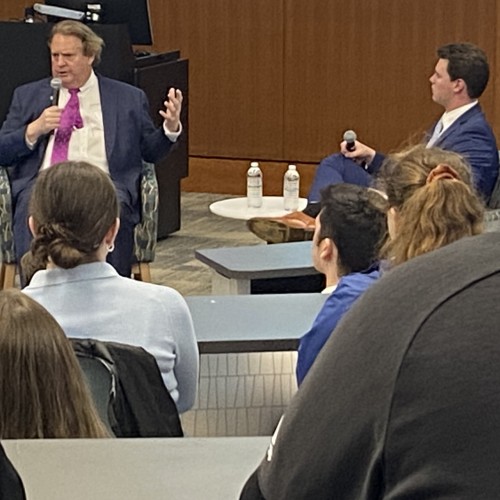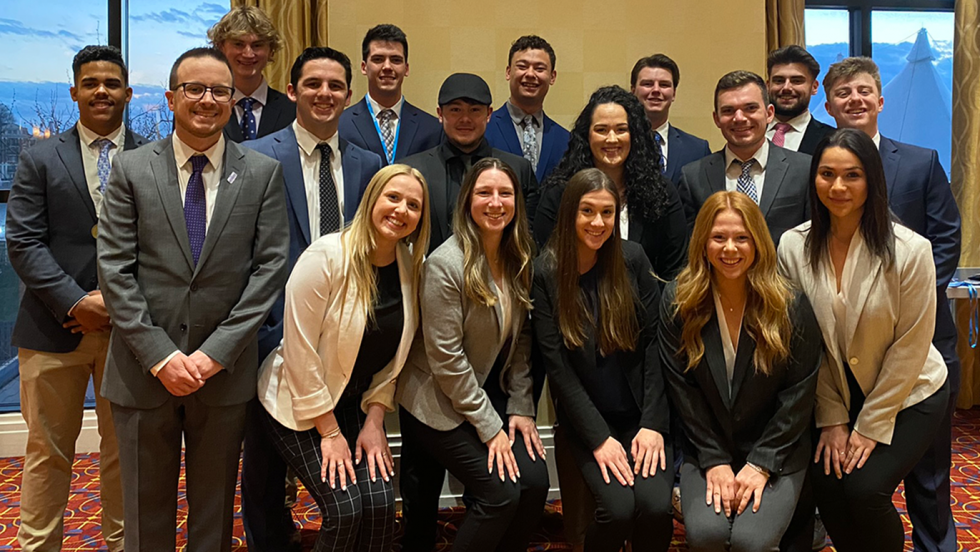
A Conversation with Leo Meehan ’75
DECA talks shop with the industry leader.
Growing up, Leo Meehan ’75 didn't consider himself a great reader. “Because of this, I was constantly trying to adapt—'How can I do well in school?' and 'How can I get into college?'” recalled the W.B. Mason President and CEO and Stonehill Trustee at an event hosted by the College’s DECA chapter. “I had to figure out a different way to do things. I became a great adapter, and that became my strength.”
Over the past 40 years, this characteristic has served Meehan well as he has grown the company to become the U.S.' second-largest, privately-held business products dealer, only trailing Staples as the largest. Throughout this time, Meehan has navigated changes in technology, the decline of traditional office supply sales, as well as the COVID-19 pandemic.
During a “Conversation with Leo Meehan,” DECA president, Alex Bates ’22, asked the industry leader about his definition of success, how to navigate change, and for his advice to graduating seniors. Meehan also shared an important—and lasting—lesson he learned from playing chess with his Plymouth housemates at Stonehill.
Rise of Technology
Graduating from Stonehill in 1975, Meehan said that he never could have imagined the world today. “The Information Age is taking over everything,” he noted of the rise of technology, particularly e-commerce selling. “Everything has changed,” he said to the students. “You were born into it and are in the front row, center—leaving you well positioned to succeed in this new environment.”
Embrace Change
Meehan credits his success to being open to change and adapting quickly. “At W.B. Mason, we change almost on a dime." The winning hand, he said, is rooted in a phrase he often repeats: “Reinforce victory and abandon defeat.” Meehan continued, “We are always refining our business model. We are willing to change plans quickly and are ready to move.”
Keep It Simple
When executing an idea or plan, Meehan said he always tries to keep it simple. “It starts off complicated and then we simplify it. This is the best way to get people to buy in, understand our mission, and execute."
Know Yourself
For the seniors in the room who are preparing for graduation and life after college, Meehan shared this insight: “Get in touch with yourself. Some strengths are displayable. For instance, organized sports provide a platform for you to showcase skills, such as being a good quarterback. Other strengths aren’t as obvious, but it does not mean you do not have them. Figure out who you are and what your strengths are. Use those gifts—they’ll never leave you.”
Get in touch with yourself. Some strengths are displayable. For instance, organized sports provide a platform for you to showcase skills, such as being a good quarterback. Other strengths aren’t as obvious, but it does not mean you do not have them. Figure out who you are and what your strengths are. Use those gifts—they’ll never leave you.
Be Authentic
Meehan interviews hundreds of potential employees. What makes someone stand out? Authenticity. “I want to know that the person sitting in front of me is really that person.” He also considers their grade point average. “If I see they achieved good grades, it means that they went for something and got it.” Interviewing skills are also important, as Meehan noted, “You can’t get a job that you don’t get a job offer for.” In his time with W.B. Mason, he has hired 300-400 Stonehill students. “Stonehill students interview well. They are always prepared, very well-spoken, and generally come off as authentic.”
Chess Moves
Meehan, who often played chess with his Plymouth housemates while at Stonehill, appreciates the strategies of the game and applies them to being a CEO. "Making decisions in business is like playing chess. You have to see the moves down the board. The more moves you can see ahead, the better."
Why a Business School?
When asked why he decided to donate to Stonehill to help create the Leo J. Meehan School of Business, Meehan talked about his long-lasting relationship with the College. He went from being a student, to selling office supplies to the College (it was part of his region when he started as a sales representative at W.B. Mason in 1975), to serving on various councils and the Board of Trustees. “I had been saying for years, ‘Stonehill needs a business school’,” he recalled. When you have had some type of success, he noted, you look for meaningful ways to give back and that is why the school became the focus of the donation for W.B. Mason.


